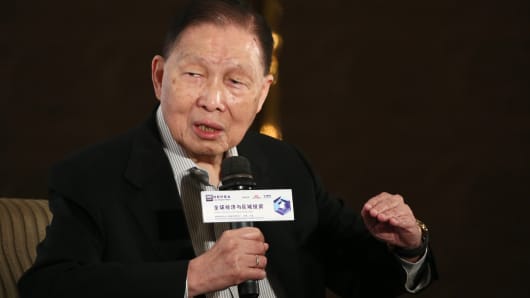The founder of major Indonesian conglomerate Lippo Group is eyeing the U.S. property market for its next investment.
Lippo Group, which controls more than $15 billion in assets, recently bought the 72-storey U.S. Bank Tower in Los Angeles for $368 million and launched a second real-estate investment trust (REIT) in Singapore - the Lippo Malls Indonesia Retail Trust - but said it will focus on the U.S. for its next purchase.
"I believe that the U.S. is in the stage of picking up," said founder Mochtar Riady who spoke to CNBC at the Credit Suisse Global Megatrends Conference.
The world's largest economy grew a meager 0.1 percent on year in the first quarter after a severe winter hampered exports and hurt investment spending, but most analysts say it will prove a temporary glitch and the economy is showing signs of a recovery.
"So at this moment, property prices in the U.S. are still considered quite reasonable - so it is a chance to move in," he said, adding that Los Angeles and New York would be their primary areas of focus.
Riady was also optimistic about growth in Indonesia, noting he expects the economy to get a boost following the upcoming presidential elections in July.
Indonesia is one of the fastest growing economies in the world, logging near 6 percent annual growth last year, but has suffered recently after the fallout from tapering by the U.S. Federal Reserve prompted a mass exodus from emerging market assets.
Indonesia's central bank was forced to hike interest rates five times since mid-2013 in an attempt to prop up the currency, which lost 26 percent last year.
The continued impact of Fed tapering, political uncertainty and a controversial mineral export ban are all seen as worry headwinds for the economy.
"After having the elections, you make people more confident about what will be going on in the future," said Riady.
"And so far I think (that) three big political parties have the same concept, same idea, so I believe they will work together and move forward to go in the right direction," he added.

Mochtar Riady, chairman of Lippo Group
The Indonesian parliamentary elections took place earlier this month, to determine the 560 members of parliament, and parties with at least 25 percent of the popular vote or 20 percent of parliamentary seats are able to field a presidential candidate in July.
The current governor of Jakarta, Joko Widodo, widely known as Jokowi, is believed to be the presidential favorite. But if Jokowa doesn't garner enough votes, he may need to form a coalition with another party, which could limit the ability to push through reforms.
Riady told CNBC he was optimistic that the new leadership would be successful in weeding out in corruption, which has long been a headwind to economic growth in Southeast Asia's largest economy.
Transparency International scores the country at 32 out of 100 on its corruption perception index, with 0 signaling highly corrupt and 100 as very clean, which gives it a ranking of 114 out of 177 countries.
"They're all [all the major candidates] very keen to show off [to] the new generation and have their new ideas to move our nation into the right direction," he added.
Rumors have circulated recently that the Lippo Group conglomerate was in talks with Caesar Entertainment regarding building a casino resort in South Korea, but Riady flat out denied these reports to CNBC.
"We are not interested in the casino business. My father always [taught] me that I have to work hard to [make] money, not [get it] from [a] casino," he said.






